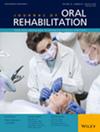Analysis of Clinical and Patient-Reported Outcomes Between Single- and Two-Implant Mandibular Overdenture—An Umbrella Review
Abstract
Background
A two-implant mandibular overdenture (TIMO) is considered a viable approach for the rehabilitation of the edentulous mandible, enhancing retention, stability, overall function and patient-reported outcome. Recently, the minimalist strategy of single-implant mandibular overdenture (SIMO) was proposed as an alternative treatment for mandibular edentulism.
Objectives
To analyse systematic reviews (SRs) and provide a comprehensive overview of clinical and patient-reported outcomes, including implant failure, peri-implant marginal bone loss, overall prosthetic complications and maintenance, patient satisfaction and oral health-related quality of life, in SIMO compared with TIMO.
Methods
The umbrella review was designed and reported following the PRISMA guidelines, and the protocol was registered in the PROSPERO database (CRD42024599304). Included SRs evaluated the clinical and/or patient-reported outcomes in edentulous patients rehabilitated with SIMO and TIMO. A literature search was conducted without restrictions on the language in Web of Science, ProQuest, SCIELO, KCI, Grants Index, Scopus, PubMed/MEDLINE and the Cochrane Library databases. Critical evaluation of the included SRs was conducted using AMSTAR 2.
Results
Out of 243 papers suitable for title/abstract screening, 7 SRs were selected. One SR favoured SIMO over TIMO for both implant failure and peri-implant marginal bone loss, whereas in another SR it was shown that TIMO revealed significantly more implant failures after 1 and 5 years, significantly more prosthetic failures after 1 year, and significantly more O-ring replacements after 5 years, compared to SIMO. Regarding the quality assessment of included SRs, two were categorised as ‘critically low’, two as ‘low’ and three as ‘moderate’.
Conclusions
SIMO corresponds with the conventional TIMO as a potentially effective treatment for the rehabilitation of the edentulous mandible. Additional studies are warranted to obtain more robust patient evidence and refine clinical guidelines.


 求助内容:
求助内容: 应助结果提醒方式:
应助结果提醒方式:


